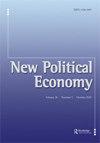The muddled governance of state-imposed forced labour: multinational corporations, states, and cotton from China and Uzbekistan
IF 3.8
2区 经济学
Q1 ECONOMICS
引用次数: 0
Abstract
ABSTRACT Forced labour persists in our global economy despite dedicated attention and eradication efforts from both the public and private sectors. Given the bounded reach and lack of enforcement by states and international organisations, the private sector has been the linchpin for eradication of forced labour globally. Utilising the brand-to-state boomerang model, this paper examines state-imposed forced labour in cotton production in China and Uzbekistan, and grapples with how interests – those of the states and the multinational corporations involved in forced labour – shape private governance outcomes. By investigating state-imposed forced labour in China (specifically, the Xinjiang Uyghur Autonomous Region) and Uzbekistan, we find that multinational corporations are reluctant to work towards eradicating forced labour when their net sales and profit are threatened by doing so. Building on the stream of international political economy research regarding how interests complicate governance effectiveness, we expose a gap in the literature on the impact of state-imposed forced labour on governance outcomes and illuminate global ramifications.国家强制劳动的混乱治理:跨国公司、国家和来自中国和乌兹别克斯坦的棉花
尽管公共和私营部门都致力于关注和消除强迫劳动,但强迫劳动在全球经济中仍然存在。鉴于国家和国际组织的范围有限,执法不力,私营部门一直是全球消除强迫劳动的关键。利用品牌到国家的回旋镖模型,本文考察了中国和乌兹别克斯坦的棉花生产中国家强加的强迫劳动,并探讨了涉及强迫劳动的国家和跨国公司的利益如何影响私人治理结果。通过调查中国(特别是新疆维吾尔自治区)和乌兹别克斯坦的国家强制强迫劳动,我们发现,当跨国公司的净销售额和利润受到威胁时,它们不愿努力消除强迫劳动。在有关利益如何使治理有效性复杂化的国际政治经济学研究流的基础上,我们揭示了国家强制劳动对治理结果影响的文献空白,并阐明了全球后果。
本文章由计算机程序翻译,如有差异,请以英文原文为准。
求助全文
约1分钟内获得全文
求助全文
来源期刊

New Political Economy
Multiple-
CiteScore
10.10
自引率
9.50%
发文量
41
期刊介绍:
New Political Economy aims to create a forum for work which combines the breadth of vision which characterised the classical political economy of the nineteenth century with the analytical advances of twentieth century social science. It seeks to represent the terrain of political economy scholarship across different disciplines, emphasising original and innovative work which explores new approaches and methodologies, and addresses core debates and issues of historical and contemporary relevance.
 求助内容:
求助内容: 应助结果提醒方式:
应助结果提醒方式:


